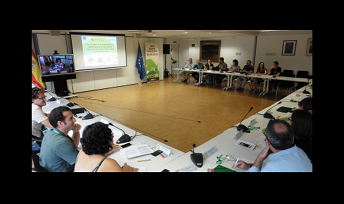
03 de July de 2017
Dinamización rural
The National Rural Network brought together representatives from the Autonomous Communities and Local Action Groups to work on the coordination procedure approved by the LEADER Cooperation Working Group.
03.07.2017
In order to meet the objectives set for the LEADER measure in Rural Development Programmes (RDP) , inter-territorial cooperation plays an essential role, aiming to connect groups from different territories with the same needs, in order to promote mutual learning and seek common solutions to specific problems.
LEADER cooperation is a way to broaden local perspectives and bring new knowledge to the area in order to improve local strategies . It aims to boost the innovative nature of local development actions and contribute to increasing competitiveness by developing capacities, attracting new business partners, and disseminating innovation, knowledge, and building new skills.
Among the tasks of the National Rural Network is providing technical assistance for inter-territorial and transnational cooperation, and facilitating cooperation between Local Action Groups (LAG) .
Since LEADER cooperation is planned for each of the regional RDPs during the 2014-2020 period , the NRN has undertaken a series of actions in this regard. To connect LAGs, LEADER events are organized annually, as well as exchanges of LEADER experiences in the region. An online partner search engine for interregional cooperation projects has also been launched. Furthermore, to promote transnational cooperation, the NRN participates in the cooperation working group organized by the European Rural Network.
On the other hand, with the aim of improving coordination between the managing authorities of the RDPs, the creation of the LEADER Cooperation Working Group was promoted, which resulted in the coordination procedure between managing authorities for LEADER cooperation projects and which, once approved by the AAGG Coordination Committee, must be implemented.
The RRN will act as a coordination platform and as a disseminator of information. As a first step in this endeavor, this workshop was organized on June 27th. The process was explored in-depth, opinions and concerns were gathered from attendees, and the design of the tool that will be used to implement it and ensure its usefulness was achieved.









